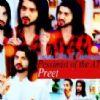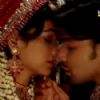We have been discussing for long that a lot of importance has been given to Arjun because Janamejay was the one to hear about the story from Vaishampayan.
This makes me feel what would have been the narrative of Vaishampayan, had Duryodhan won the war, and instead of Janamejay, Lakshman's son or grandson would have been listening this story?
I have a feeling that Jaya that was written by Vyas would have been more a documentation of events with not much importance to any character or their personal lives, that happened in the Vaishampayan narration.
But had Lakshman's son/grandson been hearing the story, would Vaishampayan have tried to conceal/omit the wrong doings and criminal acts of Duryodhan in his narration?? Would he have tried to justify those criminal acts? Would he make a statement like since Duryodhan was right therefore the greats like Bheeshm and Dronacharya and most of the Indian states supported them?? While the evil Pandavas only got the support from their in laws and evils like the son of evil Jarasangh, evil Shishupal etc.?
Just wanted your views on this...












comment:
p_commentcount